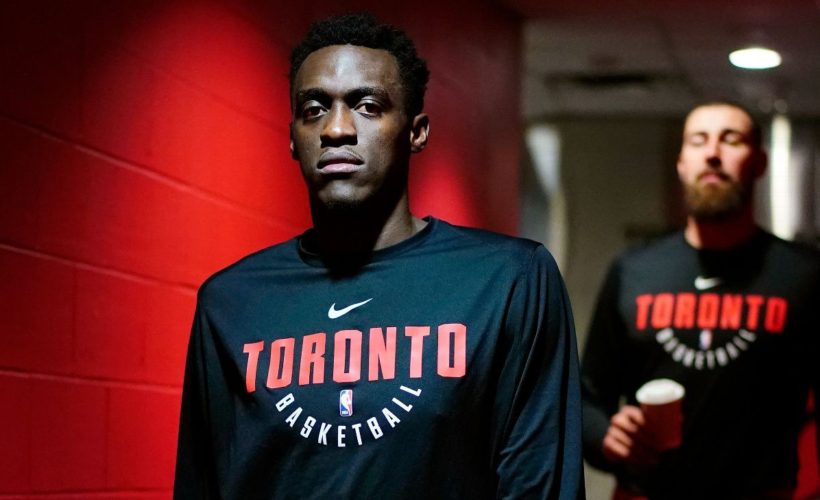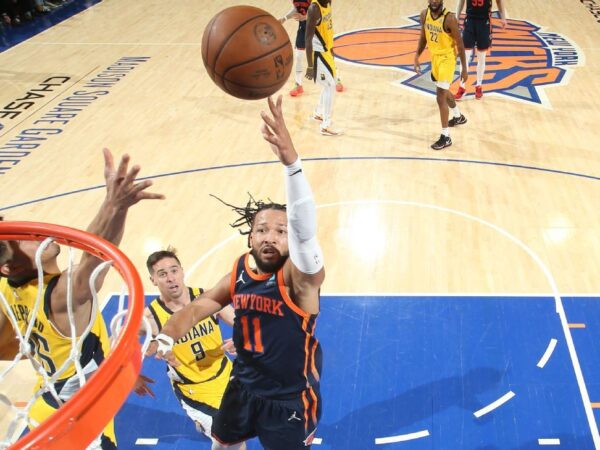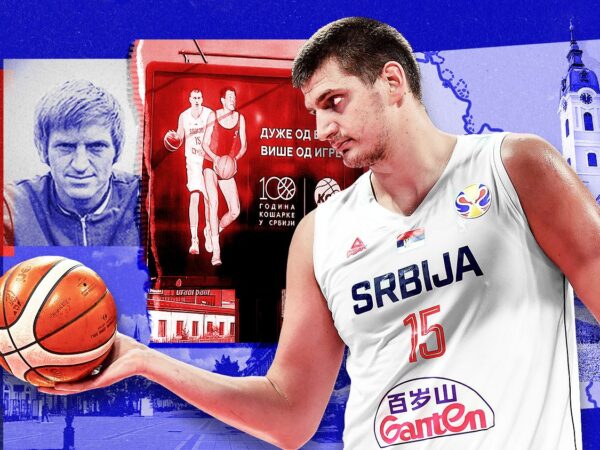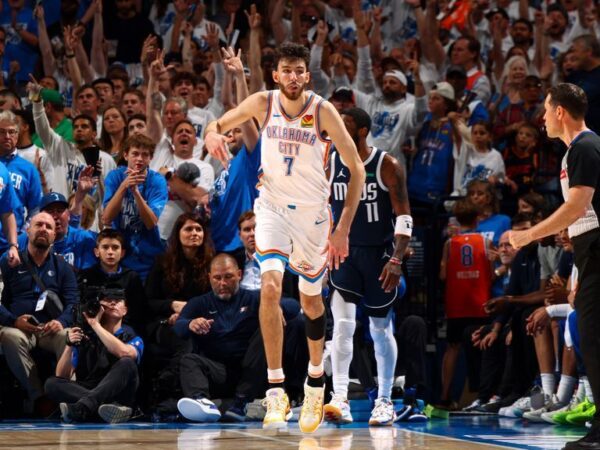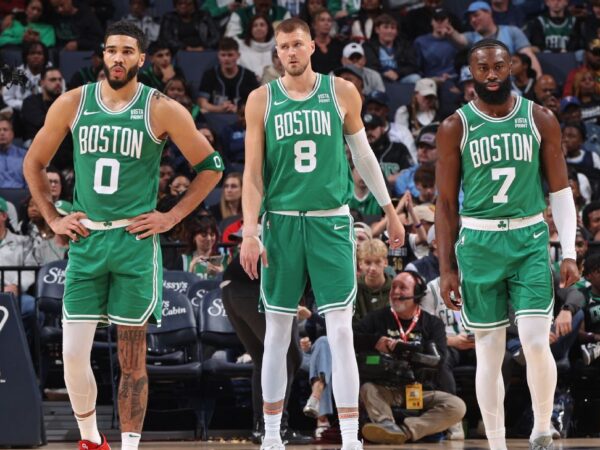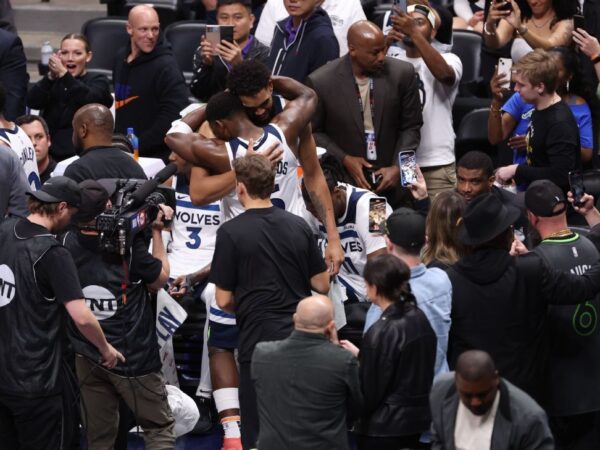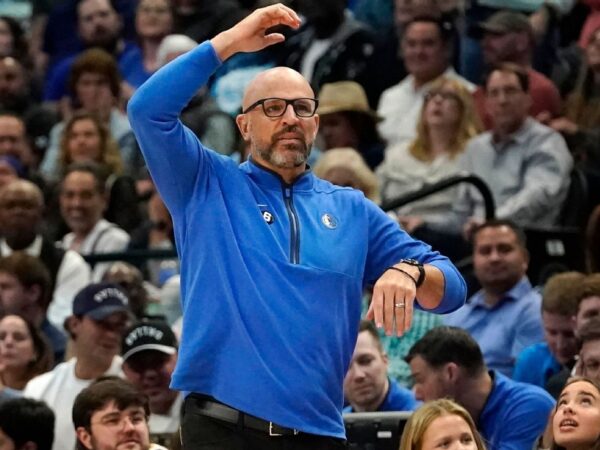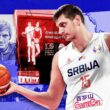THE TEAM MEETING is in seven minutes, and all Pascal Siakam and his bestie on the Toronto Raptors, Jakob Poeltl, need to do is sink four 3-pointers in a row to conclude their pregame warm-ups. Two each.
That’s it.
Siakam, his jaw taut, fans out to the arc, furrowing his brow as he launches the long ball, as if he’s studying the brush strokes of an artistic masterpiece. His spindly arms exaggerate his follow-through, just as his coaches have trained him to do.
The ball bounces high and hard off the back of the rim.
“Relax,” Poeltl says, grinning. “We got this.”
The Austrian big man, who attempted exactly two 3-pointers during the regular season (and made one), hoists his shot and chuckles as it swishes through.
Siakam gathers the ball again, his long, sleek frame glistening with sweat. He repeats his 3-point motion, running through his mental checklist: elbow tucked, arm straight, knees bent …
This time, the shot barely scrapes the front of the rim.
It goes on like this. A miss, a make, two makes, a miss. The frustration is building for both players, as they’re nearing tipoff for a late-season game against the Orlando Magic.
“Three minutes,” announces assistant coach Jim Sann. “We can’t be late again.”
Finally, with only seconds to spare, the coach resorts to the oldest trick in the basketball book: the storied countdown, time ticking off the clock, three, two, one …
Siakam rises up and releases on cue. The ball meanders around the rim, and then, almost as if it has worn itself out, reluctantly drops through.
Pascal erupts with a whoop! He smacks Poeltl in the chest. Then he sprints to the locker room.
“I can’t wait until I get to point to where I’m an elite shooter,” Siakam says after. “It’s coming — soon.”
Complete coverage | Expert picks | Bracket
• Forecast: New predictions for each series
• Why can’t AD get the respect he deserves?
• LeBron puts on clinic, Cavs school Raptors
• Celtics show resilience in Game 2 win
• Smart puts his unique stamp on playoffs
• Adams: Is ‘Playoff Rondo’ a real thing?
• NBA playoff MVPs: Ranking the top 10
• Injuries that are impacting the playoffs
• NBA offseason guides for eliminated teams
• Tickets on Vivid Seats
No matter that Siakam is statistically the worst 3-point shooter in the NBA. His effective field goal percentage, according to ESPN Stats & Information, is 26 percent below that of an average player — far and away the lowest of anyone in the league.
Yet Siakam is unfazed by this. He has, after all, been playing organized basketball for only about six years — and shooting 3-pointers for only one. Every new skill is like an unwrapped present under the tree that Pascal can’t wait to open.
His desire to learn and his relentless energy have endeared him to his coaches, but what teammates notice is the confidence. “So much confidence,” Poeltl says.
To watch Siakam sprint up and down the floor in the Raptors’ clinching Game 6 elimination of the Wizards was to witness a man realizing his potential in real time: In just 22 minutes, scoring 11 points and grabbing eight boards, he was, as usual, a key cog of the Raptors’ “Bench Mob” that has designs on being the deciding factor in its Eastern Conference semifinal series with Cleveland. In Game 1 of that series, Siakam scored 11 points — including a 3 — and bodied up on LeBron James for much of his 22 minutes.
“I will tell you honestly,” says Masai Ujiri, Toronto’s president, “when I saw Pascal in Basketball Without Borders [in 2012], I couldn’t even tell you if he was an NBA player.
“That’s how incredible his story is.”
Siakam was never slated to play professional basketball — he was supposed to be a priest. His father, Tchamo, enrolled him in a seminary in the remote village of Bafia, Cameroon, when he was 11 years old. He would remain there for the next seven years, hand-picked to embody his family’s Catholicism.
How Siakam landed alongside basketball lifers DeMar DeRozan and Kyle Lowry instead is the league’s most improbable story, one that encompasses perseverance, insubordination, an astounding NBA coincidence, family heartache — even murder.
THERE IS NOT a mark on the map — at least not on our map — to distinguish where Bafia, Cameroon, is located, so we’re relying on the kindness of an NBA mother to show us the way on a searing-hot day in March 2017.
Agnes Moute, whose son is Rockets forward Luc Mbah a Moute, grew up in the town of Bafia. So today, it is she who’s helping us navigate the dirt roads that lead out of the bustling city of Yaounde, over the Sanaga River and into this dusty village, roughly 80 miles north of Cameroon’s capital.
Our destination is St. Andrews Seminary, where Siakam spent his childhood. And when we arrive, we are greeted by the director, Father Armel Collins Ndjama, who ushers us into his sweltering office, where the overhead fan merely recirculates a swell of humidity.
Collins offers a tour and opens the door to the kitchen, where students scrub pots and pans and wash dishes. A cluster of boys languishes outside, awaiting their turn to wield an ax, cutting wood to fuel the fire for cooking. One boy half-heartedly rubs a soiled shirt against a wooden washboard, flinging soap suds in the grass.
The seminary requires the boys to complete these chores each morning. Father Collins says that when Siakam first arrived, he was punctual, dutiful, even enthusiastic about his responsibilities. But as he grew older, Collins explains, he often did not complete his tasks in time. Siakam, first in his class academically, stopped doing his homework. The seminary designates specific days to leave the property, but Pascal began coming and going as he pleased.
“He turned from a very calm child into a very stubborn boy,” Father Collins says through an interpreter. “At times, I considered dismissing him, but his academic results were so remarkable, we kept him.”
Siakam had grown up in a basketball family but had never clambered to watch the NBA games that were occasionally broadcast in Cameroon the way his three older brothers had. Each of them landed college scholarships in America: Boris at Western Kentucky, Christian at Indiana University-Purdue University Indianapolis (IUPUI), James at Vanderbilt. Pascal wished to latch onto something different but was flummoxed when his father enrolled him in St. Andrew’s. He did not believe the church was his calling, but he could not question his father.
“I would never go against his wishes,” Siakam says. “There isn’t a better man I’ve known in my life.”
Bafia is not a prosperous village, aside from one opulent home on the corner with an expansive courtyard and chiseled-stone fountains. On the day we visit, this palatial home bustles with activity, as local chiefs — their long, flowing gowns glinting in the steamy African sun — gather to discuss the concerns of their people. The list is lengthy: drought, disease, poor health care, unemployment and a contaminated water supply.
Sometimes, the gate to the home is flung open, a signal to the villagers that they can navigate the gravel pathway past the vintage European cars to pump fresh, clean water from the well in the back of the property. Occasionally, boys from the seminary are sent down the hill to fill their pails.
The morning we stop by the seminary, the boys are crammed into a bunkroom. There are upward of 70 of them. Beds are stacked on top of one another, and as the temperature spikes into the low 90s, the room reeks of dirt, bananas and sweat. This is where Siakam spent his teenage years.
The students have one hour each day, from 4 p.m. to 5 p.m., for physical activity. Often, Pascal opted to kick around a soccer ball. Occasionally, he would shoot baskets on the cracked cement court with the bent rim behind the dormitory. That was the extent of his basketball training.
“I was all right for a guy that didn’t play,” he says.
By the time he was 15, Siakam, by his own admission, grew to loathe the seminary. He did not want to be a priest, so he began to misbehave, hoping Father Collins would dismiss him. The priest devised curfew punishments for his rebellion, prompting Siakam to lash out further. It was a cycle that became arduous and tedious for both. “Our relationship,” Siakam says, “was a clash.”
“When I saw Pascal in Basketball Without Borders [in 2012], I couldn’t even tell you if he was an NBA player. That’s how incredible his story is.”
Masai Ujiri, Raptors president
He was briefly sent home to Douala on a bumpy, eight-hour bus ride, an outcome that secretly pleased him. But Tchamo insisted he return to fulfill his obligations.
“I understood early on that his father had a vision, and Pascal was not sharing it,” Father Collins says. “I knew we would probably not be able to train him to be a priest, but I still hoped we could teach him to be a man.”
“I know what he was thinking,” Siakam says. “‘Why is this smart kid doing all this dumb stuff?’ The answer was, ‘I don’t want to be here.’ I tried everything I could think of to get out.”
He grudgingly stayed until he graduated in 2012, then packed his belongings and bade Father Collins and Bafia good riddance.
By 2017, when we arrive at St. Andrews, Siakam is wrapping up his rookie NBA season. Asked if he is surprised about the success of his former student, the priest replies, “No. When Pascal put his mind to it, he was capable of most anything.”
Perhaps, Siakam says now, that was the problem. He didn’t know what he wanted back then. When he walked to the market to buy plantains, passing by the ostentatious mansion on the corner, he wondered who lived there and daydreamed about owning his own spacious home with fountains and statues.
Later, he learned, the house belonged to Mbah a Moute’s parents. For seven years, Pascal Siakam lived just 3 kilometers away, yet their paths never crossed. That was about to change — for it was Mbah a Moute who would discover Siakam and kick-start his basketball career.
SIAKAM WENT TO Luc Mbah a Moute’s basketball camp on a lark. It was the summer of 2011, and Siakam, on break from St. Andrew’s, had tagged along with some childhood friends. Mbah a Moute was the unofficial patron saint of basketball in Cameroon. He established his free camps to encourage the sport of basketball to flourish in his native land and to provide young, promising talent such as Joel Embiid and Siakam’s brothers an opportunity to pursue their talents further.
With his three brothers having played college basketball, Pascal’s family’s basketball reputation had gained him entry, but he had no expectations of being noticed.
Like the wildly talented yet unpolished Embiid before him, though, Siakam possessed an undeniable athleticism and competitiveness, which captured the imaginations of the coaches. He was raw but lively, skinny but willing to absorb contact. In Cameroon, young basketball players are measured by potential, not results.
After his second summer at Mbah a Moute’s camp in 2012, Siakam was shocked to learn that he had been chosen to attend Basketball Without Borders. Siakam realized what was at stake. If he played well and showed promise, he’d score a ticket to America like his brothers had before him. When it was his turn to scrimmage, he played with a fervor he hoped would distinguish him, leaping to block shots, diving for loose balls. His shooting skills were rudimentary, but, as Ujiri notes, “His effort was memorable.”
He landed a scholarship to God’s Academy in Lewisville, Texas, then one year later parlayed that into a scholarship offer to New Mexico State.
When he called James to share the news, his brother thought it was a prank. “I laughed at him,” James Siakam says. “I said, ‘You? Basketball? I don’t believe it.”’
Siakam redshirted at New Mexico State for the 2013-14 season, spending every free moment in the gym. On the rare occasions when he called home, Pascal could hear the pride in his father’s voice. By then, the disappointment over his actions at St. Andrew’s had been forgiven, but not forgotten.
On the eve of the 2014-15 New Mexico State preseason, Siakam was in his dorm room when his phone rang. It was his sister Raissa, who was also studying in the United States.
In between halting sobs, she informed Pascal that their father had been killed in a car accident. “I don’t remember anything about it,” Pascal says. “It is all a blank.”
Within minutes, James also called. Pascal had questions, but their mother, Victorie, was consumed with grief. Details were scarce. All the children knew was that Tchamo had been involved in a two-car collision and taken to a nearby hospital, where he had survived four days with Victorie at his side before dying of internal injuries.
“It was so difficult for my mother; we didn’t push her,” James says. “All these years later, we are still learning bits and pieces.”
Siakam centered on only one thought: I need to go home. James had already booked his flight to Douala, but Pascal had applied for a new visa that was still being processed. If he flew to Cameroon, there was a strong chance he would not be able to return to the U.S. without the proper paperwork. “My brothers are saying, ‘You can’t come.’ My mother says it, too,” Pascal says.
New Mexico State coach Marvin Menzies, who had lost his own father two years earlier, rushed to his player’s side. He made some phone calls, but it quickly became clear Siakam’s best option would be to make the heart-wrenching decision to miss his father’s funeral. If he went home to Cameroon, he risked losing his scholarship and his future as a potential pro prospect.
Pascal scribbled “RIP Dad” on his shoes and dedicated his season to Tchamo. Many nights, he wept quietly in his room, aching for home. “It’s something that has never really left Pascal’s heart,” James says, “knowing that he wasn’t there for the funeral.”
Siakam was named WAC Freshman of the Year in a season that remains a blur of sadness and pain. The following season, in 2015-16, he averaged 20.2 points, 11.6 rebounds and 2.2 blocks, and was named WAC Player of the Year. “Pascal became more passionate about his development after the passing of his father,” Menzies says. “He embraced it as motivation to make his father proud.”
Siakam decided to make the jump to the NBA, and the Raptors invited him to a pre-draft workout in Buffalo. Before the workouts, he approached Skal Labissiere and Poeltl to exchange salutations. But when the groups were split up, Poeltl and Labissiere were ushered to one basket, while Pascal was placed with the second-tier prospects at another.
“I went crazy,” Siakam says. “My best workout ever. I was pissed off, and I played like it.”
Raptors coach Dwane Casey noted his defensive stance, his footwork and his pursuit of the ball. But mostly, he was taken with Siakam’s energy. “He has the best motor of any player I’ve seen,” Casey says.
Two weeks later, Toronto selected Siakam with the 27th pick in the 2016 draft. Three months after that, the night before a preseason game against the Washington Wizards, Siakam saw his mother for the first time in four years. She came to see Raissa, who lived in the D.C. area, and to watch Pascal play.
Pascal hadn’t folded his mother in his arms since his father died. James estimates it has been 16 years since all the siblings have been in the same room together. Victorie remarked that Pascal looked taller, stronger, older. They ate pizza at a restaurant near the hotel and tried to fill in the gaps of missed birthdays, holidays and milestones. Pascal says his mother was mostly stoic during that visit. “She doesn’t like to show her emotions,” he says, “but I’m sure she cried later.”
Five days later, the first NBA game Pascal Siakam ever saw in person was the first one he ever played in — as a rookie starter.
PASCAL SIAKAM HASN’T been back to Cameroon in nearly five years. He finds himself drifting back to Bafia, to the seminary and to the hard lessons he learned from Father Collins. His best friend from the seminary, Ludovic Zitchem, continues to pursue his religious training in Cameroon and keeps Siakim abreast of news from home. Zitchem checks on Victorie and calls his old friend from time to time.
On May 10, 2017, Siakam’s phone jangled in the middle of the night. It was Zitchem, and Siakim’s heart jumped.
No, not my mother. Please, not my mother, he thought. “Your mom is fine,” Ludovic assured him. It was Father Collins. He had been found dead in his home, and foul play was suspected.
The mystery would deepen three weeks later, when the body of Bafia Bishop Jean-Marie Benoit Balla was pulled from the Sanaga River by a fisherman. A subsequent autopsy would conclude that the bishop, a close associate of Father Collins, had been tortured and murdered.
Bafia officials continue to investigate whether the two deaths are connected. “I was shocked,” Siakam says. “I felt bad, a little guilty, you know?” There were things he would have liked to have said to Father Collins, regrets that still linger now.
Today, Siakam is determined to bring Victorie to America so he and his brothers can care for her. He talked to Mbah a Moute about this when the Rockets came to town on March 8 and the two went to dinner. That night, they discussed their families, their country and Father Collins.
Mbah a Moute congratulated Siakim on his burgeoning role on the Bench Mob. He praised Siakam’s most unorthodox and unlikely journey to the NBA. They were 6,000 miles from that bunk room in Bafia, where just a few years earlier, Siakam had plotted his escape.
But the distance surely felt greater than that.
Source:ESPN

